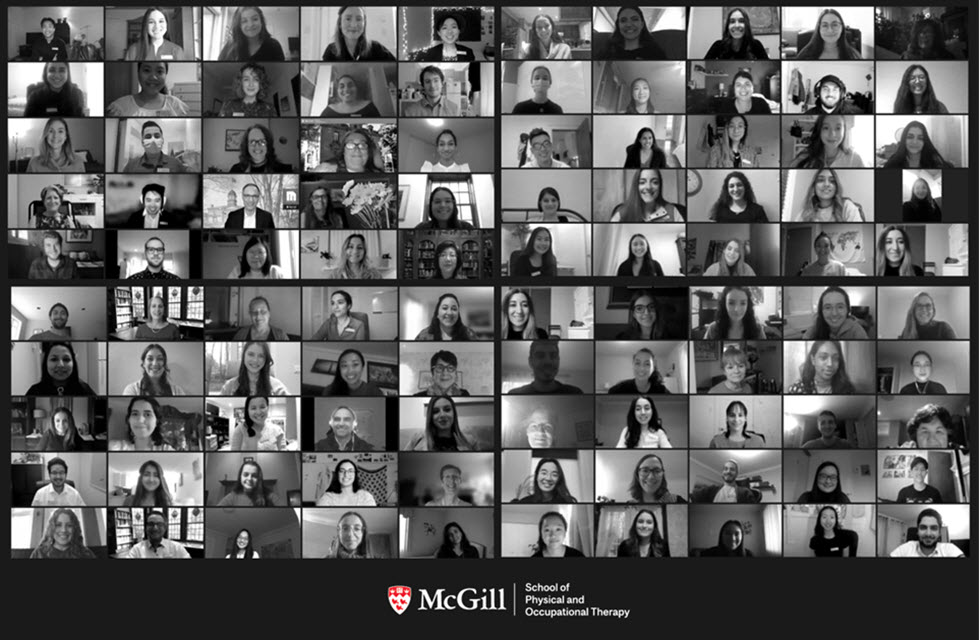McGill’s School of Physical & Occupational Therapy (SPOT) recently recognized both the 2020 and 2021 cohorts of occupational therapy (OT) and physical therapy (PT) professional program students for successfully reaching the milestone moment marking the transition from classroom learning to clinical experience. The Name-Tag Ceremony is considered the equivalent of the engineering Iron-Ring ceremony and medicine’s White Coat ceremony for SPOT. Faculty and staff are proud to celebrate this transition with the students each year.
The theme for the event for the 2021 group was transformation – symbolically the transformation from classroom student to clinical learner. The guest speakers addressing the (virtual) attendees honoured this theme with eloquence.
Dr. Laurie Snider, SPOT Director and Associate Dean, welcomed the assembled students with a reminder of the symbolic value of the event. “This name-tag ceremony represents a seminal milestone on your journey towards the goal to become occupational therapists and physical therapists. Although the actual transition to clinical education happened last year, here we are, honouring your milestone together. Your journey began in the classroom where you learned important foundation knowledge, assessment tools and practical skills, all within the context of advances in rehabilitation research. Mentorship is our theme for this year, a theme that captures our big picture view of health and rehabilitation. Mentorship is arguably the single most important developmental tool for the progression of a professional in training.”
Due to the pandemic, last year’s cohort had their ceremony postponed by a year, though the students received their name-tags last spring by mail. The theme for this re-scheduled ceremony was mentorship.
Lynn Gillespie, PT, was invited to address the students, and she advised that they, “Recognize the power of mentorship as a potential new venue of support for you; the presence of a mentor is a potent resource and provides a safe environment to help you to navigate the clinical arena. There is really a circular benefit to mentorship: it offers role-modeling, support and guidance to the mentee but also stimulation, satisfaction and rejuvenation for the mentor. This shared professional passion is a loop!”
Odrée Martin-Mailhot, OT, was the other clinical speaker. Odrée explained to the students that, “The mentor can support you towards the transition from being a student to becoming an OT, and ultimately, to embodying the profession of OT. In other words, the mentor prepares you for the “real thing” while guiding you to discover the “real you” as an OT.”
Support from the leadership of the Faculty of Medicine and Health Sciences was evident at both celebrations. Dr. David Eidelman, Vice-Principal (Health Affairs) and Dean of the Faculty of Medicine and Health Sciences addressed the students and assembled faculty members. Thanks to Dr. Eidelman’s support, guidance, and stellar and steadfast leadership in navigating the many challenges SPOT faced this year, SPOT has endured and prevailed in their educational covenant with their students and the broader communities served by the School.
Also speaking to the assembled students, Dr. Samuel Benaroya, Associate Vice-Principal of Health Affairs and Vice Dean, Faculty of Medicine and Health Sciences, is recognized as a crucial partner to the success of SPOT. Dr. Benaroya plays a seminal role overseeing all external Hospital Affairs and the RUISSS for the Faculty, and as such works closely with SPOT in fostering/supporting effective relationships with clinical partners. He helps solve many of the challenges faced by SPOT, particularly recently, in this period of major changes.
May 4, 2021

